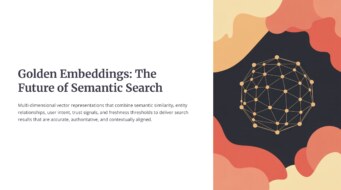Query Augmentation is the process of enriching a user’s original query with contextually relevant terms, entities, or phrases to improve retrieval accuracy and semantic relevance.
Unlike simple keyword expansion, it operates within a semantic content network — where meaning, relationships, and context guide search systems to interpret what users intend rather than what they literally type.
In modern search pipelines, augmentation is central to retrieval-augmented generation (RAG), hybrid dense vs sparse retrieval models, and query optimization frameworks that align language models, search engines, and human expectations.
By integrating query semantics, canonical search intent, and information retrieval, query augmentation becomes a bridge between user intent and document meaning.
How Query Augmentation Works?
1. Detecting Ambiguity and Context Gaps
Search engines begin by assessing whether the incoming query lacks clarity or contains ambiguous entities.
Systems rely on entity graphs and contextual embeddings to determine if terms have multiple interpretations — e.g., “Apple revenue” could refer to the brand or the fruit.
Augmentation engines flag such cases for enrichment using semantic similarity scoring and prior click-behavior data.
2. Generating Candidate Augmentations
Next, the system generates potential expansions through three main channels:
Historical Logs: Past high-performing queries (with strong CTR or dwell time) are stored as “augmentation queries.”
Knowledge Sources: Structured data such as Schema.org entities or knowledge-graph embeddings provide entity attributes that inspire additional phrases.
LLM Synthesis: Modern systems employ large language models like BERT, GPT-4, or LaMDA to generate pseudo-documents or paraphrased questions, similar to query rewriting but broader in scope.
Each candidate is tested for semantic relevance and intent alignment before entering the augmentation pool.
3. Selecting the Best Augmentations
The system evaluates each candidate using performance metrics such as click-through rate, precision, and normalized discounted cumulative gain (nDCG).
Queries that consistently return authoritative results are prioritized, contributing to the site’s topical authority and improving ranking signal consolidation.
4. Applying Augmentation in Retrieval
Once selected, augmentation terms are merged with the user’s query through:
Term Appends: Adding synonyms, modifiers, or contextual cues.
Semantic Rewrites: Rephrasing the query into its canonical form.
Parallel Branches: Creating multiple augmented versions executed simultaneously — each capturing a different sub-intent.
The results are re-ranked via dense retrievers such as DPR or neural re-rankers, ensuring the highest-scoring passages surface at the top.
The Query Augmentation Pipeline
A modern augmentation pipeline blends symbolic reasoning, statistical weighting, and neural embeddings into one continuous feedback loop:
Input Analysis: Parse linguistic structure and detect word adjacency patterns.
Entity Recognition: Map entities to nodes within the knowledge graph for contextual understanding.
Candidate Expansion: Use embeddings and distributional semantics to identify semantically similar concepts.
Scoring & Selection: Employ learning-to-rank models to score augmented queries.
Retrieval & Re-ranking: Integrate both dense and sparse retrieval outputs for hybrid precision.
Feedback Adaptation: Continuously refine augmentation weights based on click models and update score tracking to sustain freshness and authority.
This cyclical architecture mirrors sequence modeling — each retrieval step depends on the semantic context established by previous augmentations.
Key Frameworks and Architectural Evolution
Traditional IR Approach
Classical information retrieval systems relied on lexical matching using BM25.
Augmentation entered this ecosystem as a corrective mechanism — aligning lexical recall with semantic precision.
By fusing BM25 and probabilistic IR with augmentation layers, search engines could bridge vocabulary mismatches and achieve higher recall.
Neural and LLM-Driven Approach
Modern augmentation uses contextual embeddings from BERT and Transformer models to generate meaning-aware expansions.
LLMs perform pseudo-document generation — crafting synthetic summaries or sub-questions that represent the query intent.
These models interpret contextual borders, manage contextual flow, and apply augmentation dynamically across user sessions.
Hybrid RAG and Knowledge-Aware Architecture
In retrieval-augmented generation systems, query augmentation sits between query encoding and document retrieval.
It expands the query’s representational scope before feeding it into the vector database for semantic indexing.
When combined with entity disambiguation techniques and structured data markup, this ensures that generative answers draw from accurate, entity-anchored sources.
Advantages of Query Augmentation
1. Improved Semantic Precision
By enriching queries with related terms and entities, augmentation strengthens semantic similarity between user intent and document meaning. This bridges the gap between how users search and how content is written.
For example, a user searching “best budget laptops” may also retrieve results optimized for “affordable notebooks” due to contextual alignment — a direct result of query optimization pipelines powered by augmentation.
2. Better Retrieval Coverage
Augmentation enhances recall without sacrificing precision. By expanding or rephrasing a query through query expansion vs. augmentation, systems ensure that all relevant documents are considered, even if the exact keywords differ.
This also reduces the impact of keyword cannibalization within site content — since search engines interpret related phrases as part of the same intent cluster rather than competing ones.
3. Enhanced Personalization
Modern augmentation models integrate user-context-based search to personalize retrievals. By analyzing session data, previous queries, and engagement metrics, the system dynamically adjusts augmented terms.
For example, if a user repeatedly searches “local SEO tools,” the engine may automatically append “Google Business Profile” or “citation management” in future queries — reflecting learned contextual preferences.
4. Higher Click Satisfaction & Reduced Friction
Search engines rely on click models and dwell-time analysis to evaluate satisfaction. Query augmentation ensures that the first set of results is already semantically tuned, reducing user reformulation loops.
This directly impacts search engine ranking and engagement metrics, reinforcing trust signals across the site’s topical map.
Limitations and Challenges
1. Over-Expansion and Noise
If not carefully controlled, query augmentation may introduce irrelevant or overly broad terms, lowering precision and overwhelming ranking algorithms.
For instance, expanding “AI marketing tools” into “artificial intelligence research” can shift context from commercial to academic — diluting topical focus and contextual coverage.
2. Data Bias and Dependency
Augmentation systems depend heavily on query logs, click-through data, and historical data for SEO.
If past user interactions reflect bias (e.g., favoring specific brands or geographies), augmented results perpetuate the same bias.
Moreover, inadequate data volume in new sites or localized markets can hinder augmentation reliability.
3. Computational and Privacy Costs
LLM-driven augmentation — such as GPT or LaMDA-based pseudo-document generation — increases resource consumption and introduces potential data leakage risks.
Personalized augmentations that depend on user profiles must respect search engine trust and privacy policies, especially within enterprise or medical domains.
4. Evaluation Complexity
It’s difficult to measure the standalone success of augmentation. Metrics like nDCG and MRR gauge retrieval performance but may not reflect user satisfaction.
Hence, continuous update score monitoring and adaptive testing are essential for sustainable performance.
Implications for Semantic SEO & Content Strategy
1. Optimizing for Augmented Queries
In the semantic era, optimizing for exact keywords is less effective than covering the augmented intent network around a query.
Each content node should address a central search intent while linking contextually to related subtopics. This approach aligns with SEO silo structures — where meaning flows between connected articles.
In practice:
Incorporate entity variations, synonyms, and question-based subheaders.
Map your topics using a semantic content brief that anticipates augmented search phrases.
Ensure strong internal link signals across related entities to reinforce topical depth.
2. Role in Entity and Knowledge Graph SEO
Search engines use query augmentation to better understand entity relationships. Optimizing for this means structuring data with Schema.org and structured data and maintaining clean entity disambiguation practices.
This ensures that your brand appears consistently across augmented variations of an entity — whether users search “Nizam Ud Deen SEO Consultant” or “Pakistan semantic SEO expert.”
3. Integration with Content Freshness
Augmented search systems reward content that reflects ongoing relevance. Regular updates to entity-rich pages improve update score, helping your site qualify for newly generated augmented queries in trending topics.
Pairing content updates with query rewriting analysis keeps your content discoverable within the dynamically expanding web of meanings.
4. Local and Personalized SEO Benefits
For local entities, augmentation tailors queries based on local SEO signals — city, region, and service category.
For example, “digital marketing agency” becomes “SEO service provider in Karachi” through entity-aware augmentation, aligning perfectly with Google My Business attributes and local citations.
Future Outlook of Query Augmentation
1. Rise of Multimodal Augmentation
Future systems will augment across modalities — combining text, image, and voice inputs into one semantic frame. For instance, conversational search experiences already leverage this with follow-up prompts and visual verification.
2. On-Policy Optimization with LLMs
Research like On-Policy Pseudo-Document Query Expansion (OPQE, 2025) shows that lightweight prompting may outperform complex reinforcement learning for query augmentation — emphasizing efficiency over brute-force training.
This shift mirrors how contextual embeddings evolve dynamically rather than statically retraining models.
3. Integration with Knowledge-Based Trust
Google’s continued move toward knowledge-based trust ensures augmented results favor authoritative and factually correct content.
Future systems will merge credibility signals — such as E-E-A-T and semantic signals — with augmentation to maintain both relevance and reliability.
4. Real-Time Query Evolution
Augmentation will soon occur live within semantic search engines — adjusting queries mid-session based on dwell metrics, interaction data, and intent drift.
This represents a shift from static retrieval to dynamic, conversational discovery, where every click refines future augmentations.
Frequently Asked Questions (FAQs)
What’s the difference between query augmentation and query expansion?
While both add context to user queries, expansion typically adds synonymous terms, whereas augmentation combines expansion, rewriting, and contextual refinement using behavioral or entity data — aligning closely with query optimization.
Does query augmentation replace traditional keyword targeting?
No. It extends it. By optimizing content for semantically related and augmented phrases, your pages gain visibility across multiple intent clusters within the topical map.
How does query augmentation improve voice search?
In voice-based systems, augmentation converts incomplete speech commands into full, meaningful queries. For instance, “nearest cafe” might auto-augment into “nearest open cafes in Lahore right now.”
Is query augmentation relevant for small websites?
Yes. Even smaller sites can benefit by aligning their internal architecture with contextual bridges and contextual flow, ensuring each page contributes meaningfully to broader semantic clusters.
What metrics best measure augmentation success?
Use retrieval metrics like precision, recall, nDCG, and mean reciprocal rank, alongside behavioral metrics like CTR and dwell time for holistic assessment.
Final Thoughts on Query Augmentation
Query augmentation represents a fundamental evolution in how search systems interpret and respond to human intent. By transcending simple keyword matching, it transforms search into a context-aware, meaning-driven process, where relevance is defined not just by lexical overlap but by semantic alignment between what users mean and what content conveys.
In modern retrieval pipelines—spanning RAG architectures, hybrid retrieval models, and large language model (LLM) frameworks—augmentation serves as the connective tissue between human language and machine understanding. It empowers search systems to adapt dynamically, anticipate ambiguity, and retrieve information that genuinely satisfies intent rather than merely echoing phrasing.
Want to Go Deeper into SEO?
Explore more from my SEO knowledge base:
▪️ SEO & Content Marketing Hub — Learn how content builds authority and visibility
▪️ Search Engine Semantics Hub — A resource on entities, meaning, and search intent
▪️ Join My SEO Academy — Step-by-step guidance for beginners to advanced learners
Whether you’re learning, growing, or scaling, you’ll find everything you need to build real SEO skills.
Feeling stuck with your SEO strategy?
If you’re unclear on next steps, I’m offering a free one-on-one audit session to help and let’s get you moving forward.
Table of Contents
Toggle




Leave a comment